Short-Term Summer 2026 Programs
Short term study abroad summer courses are faculty-led and sponsored through individual departments within the College of Agriculture. They are designed so that students still have time to enroll in another summer session courses, participate in an internship, have a summer job, etc. Normally students earn three credits for the two to four week courses. Students pay a study abroad fee instead of Purdue summer tuition.
Heartland to heartland: agriculture in belgium, germany and THE NETHERLANDS
This program is FULL for Summer 2026.
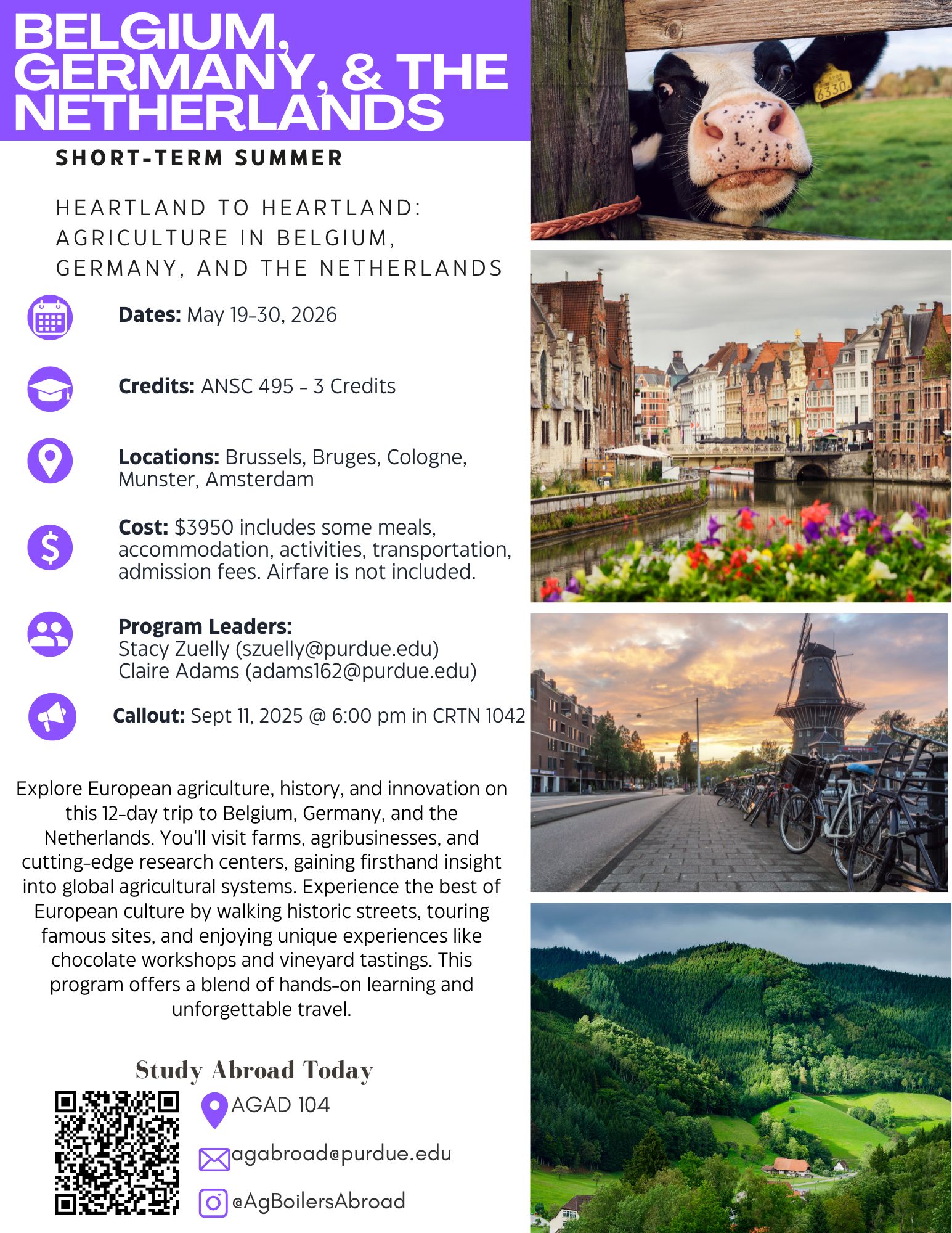 May 19-30, 2026
May 19-30, 2026- Credits: ANSC 49500 – 3 credits
- Cost: $3950 which includes accommodation, admission fees, transportation in countries, 3 credits, international medical insurance, some meals. It does not include airfare, some meals, personal expenses or souvenirs.
- Leaders: Claire Adams-Weaver & Stacy Zuelly
- Callout: September 11, 2025 @ 6:00 pm in Creighton Hall 1042
Discover the heart of European agriculture, history, and innovation! This 12-day study abroad adventure takes you through Belgium, Germany, and the Netherlands—three countries rich in cultural heritage and agricultural leadership. Explore everything from Belgian draft horse farms and dairy operations to cutting-edge facilities like the Netherlands Plant Eco-Phenotyping Center and CLAAS Technoparc. Along the way, enjoy chocolate-making workshops, vineyard tastings, and a tour of the iconic Aalsmeer Flower Auction. Walk the historic streets of Brussels, Cologne, and Amsterdam, and visit meaningful sites like the Arnhem WWII battlefield. You’ll gain firsthand insight into global agricultural systems while experiencing some of Europe’s most vibrant cities. Whether you're passionate about animal science, sustainable farming, or international perspectives, this program is packed with hands-on learning and unforgettable moments. Join us and see how agriculture connects communities across borders.
In The English Landscape
This program is FULL for Summer 2026.
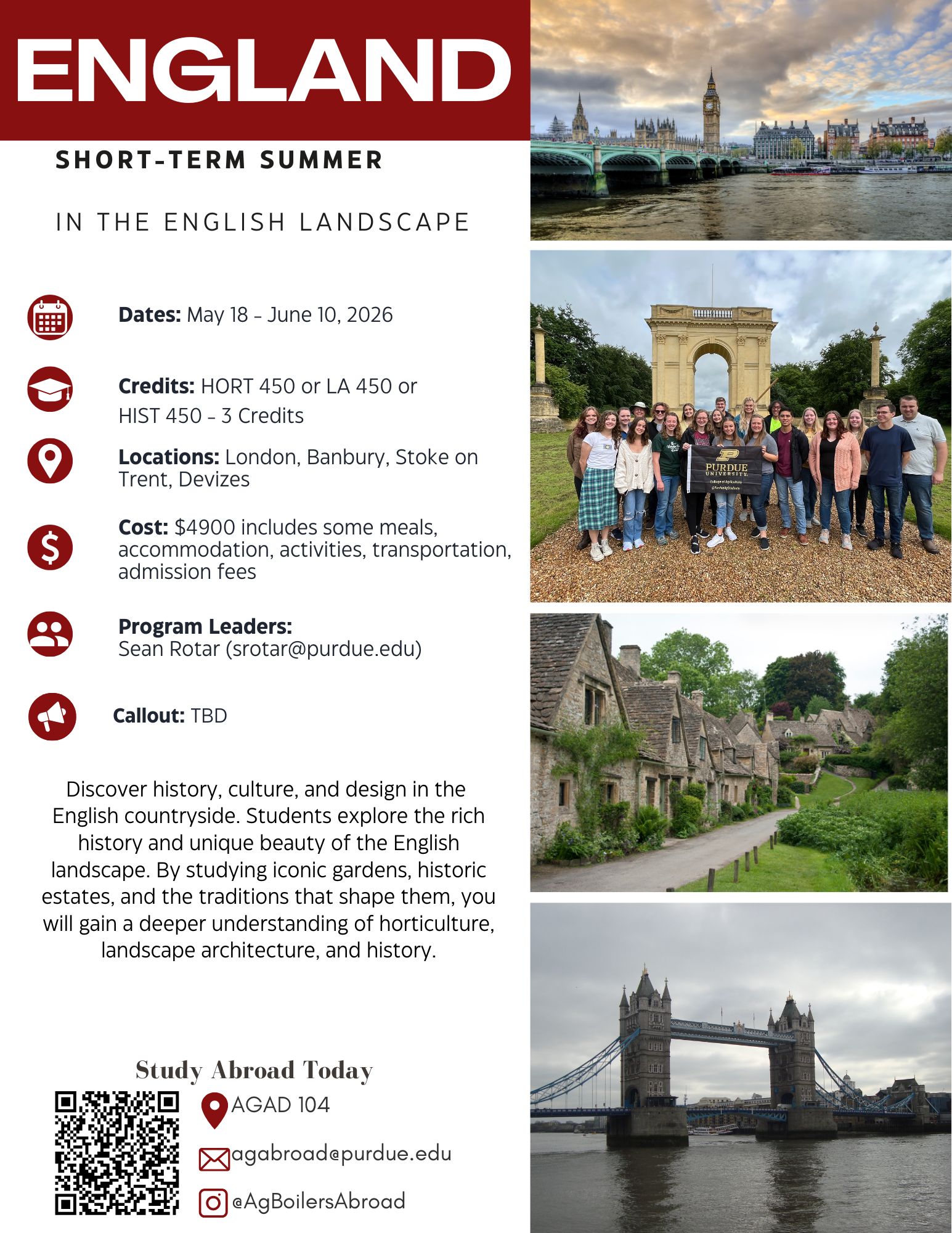 May 18 - June 10, 2026
May 18 - June 10, 2026- Credits: HORT 450 or LA 450 or HIST 450 - 3 credits
- Cost: $4900 includes housing, some meals, admission fees, medical insurance, 3 credits, transportation in country. Airfare is not included.
- Leaders: Sean Rotar &
- Callout: TBA
Explore England like never before—through its stunning landscapes! From iconic gardens and royal parks to charming countryside and bustling city spaces, you’ll see how the English landscape tells the story of history, culture, and daily life. Walk through spaces that blend beauty and function, discover plants you won’t find back home, and experience a country that treasures its green spaces. This is your chance to live and learn in England while seeing how landscapes shape the way people work, play, and connect.
AGRICULTURE & NATURAL RESOURCES in ICElAND
This program is FULL for Summer 2026.
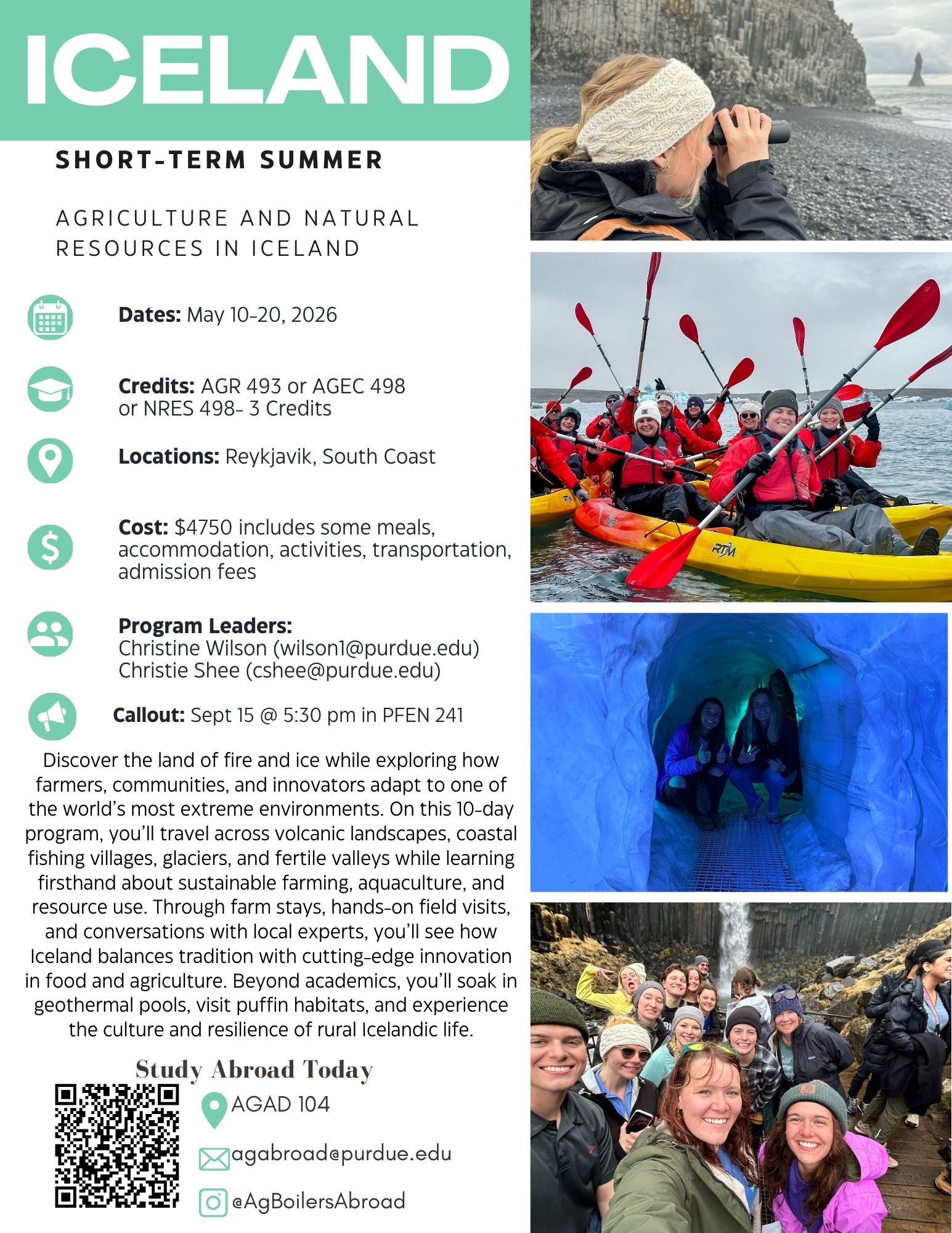 May 10-20, 2026
May 10-20, 2026- Credits: AGR 49300 or AGEC 49800 or NRES 49800 – 3 credits
- Cost: $4750 which includes accommodation, admission fees, transportation in countries, 3 credits, international medical insurance, some meals. It does not include airfare, some meals, personal expenses or souvenirs.
- Leaders: Christine Wilson & Christie Shee
- Callout: September 15, 2025 at 5:30 pm in PFEN 241
Discover the land of fire and ice while exploring how farmers, communities, and innovators adapt to one of the world’s most extreme environments. On this 10-day program, you’ll travel across volcanic landscapes, coastal fishing villages, glaciers, and fertile valleys while learning firsthand about sustainable farming, aquaculture, and resource use. Through farm stays, hands-on field visits, and conversations with local experts, you’ll see how Iceland balances tradition with cutting-edge innovation in food and agriculture. Beyond academics, you’ll soak in geothermal pools, visit puffin habitats, and experience the culture and resilience of rural Icelandic life.
The Role of HorSES in IRISH CULTURe & Society
This program is FULL for Summer 2026.
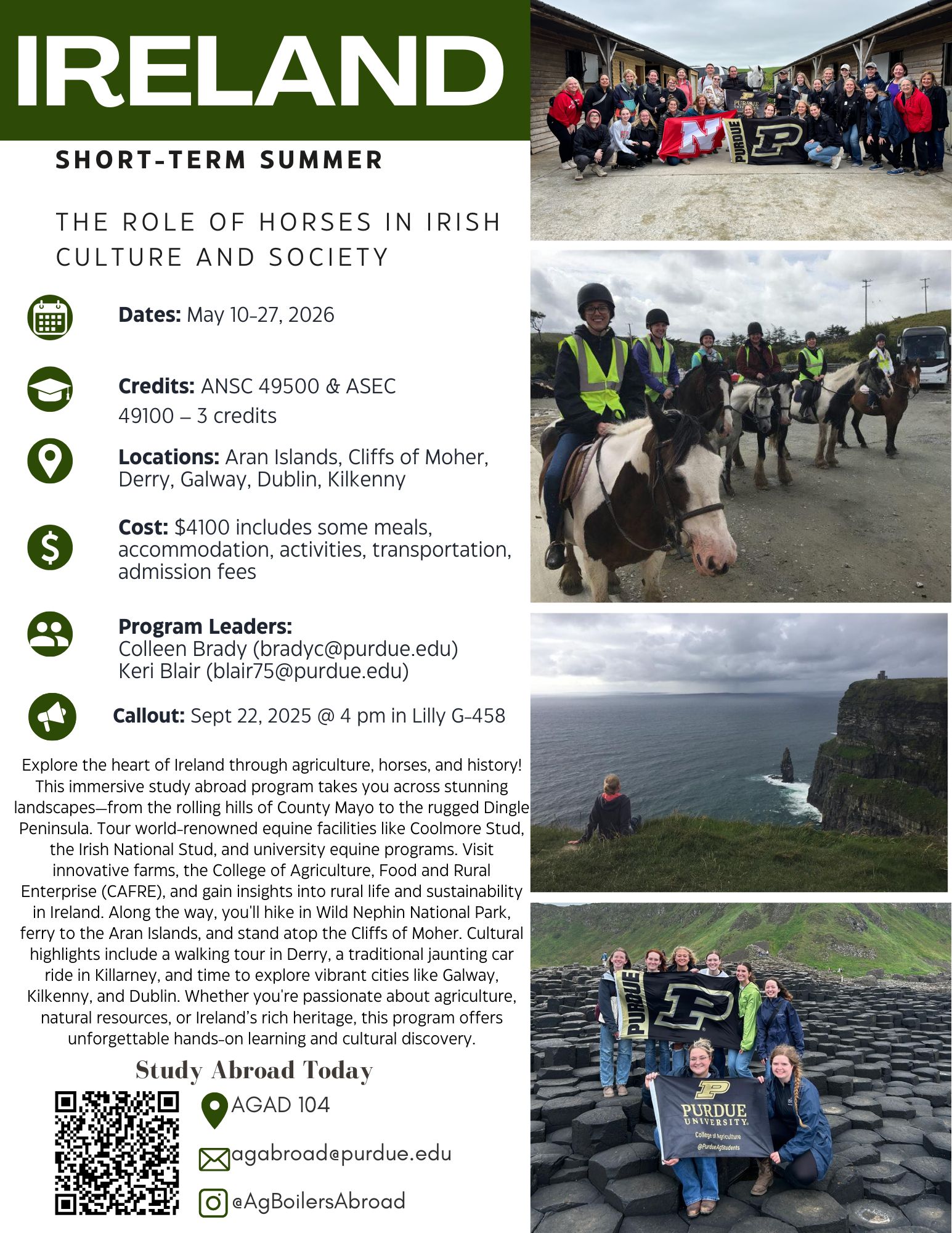 May 10-27, 2026
May 10-27, 2026- Credits: ANSC 49500 & ASEC 49100 – 3 credits
- Cost: $4100 which includes accommodation, admission fees, transportation in countries, 3 credits, international medical insurance, some meals. It does not include airfare, some meals, personal expenses or souvenirs.
- Leaders: Colleen Brady & Keri Blair
- Callout: September 22, 2025 @ 4:00 pm in Lilly G-458
Explore the heart of Ireland through agriculture, horses, and history! This immersive study abroad program takes you across stunning landscapes—from the rolling hills of County Mayo to the rugged Dingle Peninsula. Tour world-renowned equine facilities like Coolmore Stud, the Irish National Stud, and university equine programs. Visit innovative farms, the College of Agriculture, Food and Rural Enterprise (CAFRE), and gain insights into rural life and sustainability in Ireland. Along the way, you'll hike in Wild Nephin National Park, ferry to the Aran Islands, and stand atop the Cliffs of Moher. Cultural highlights include a walking tour in Derry, a traditional jaunting car ride in Killarney, and time to explore vibrant cities like Galway, Kilkenny, and Dublin. Whether you're passionate about agriculture, natural resources, or Ireland’s rich heritage, this program offers unforgettable hands-on learning and cultural discovery.
A TASTE OF SOUTHERN ITALY: PRODUCTION, PREPaRATION, Marketing
This program is FULL for Summer 2026.
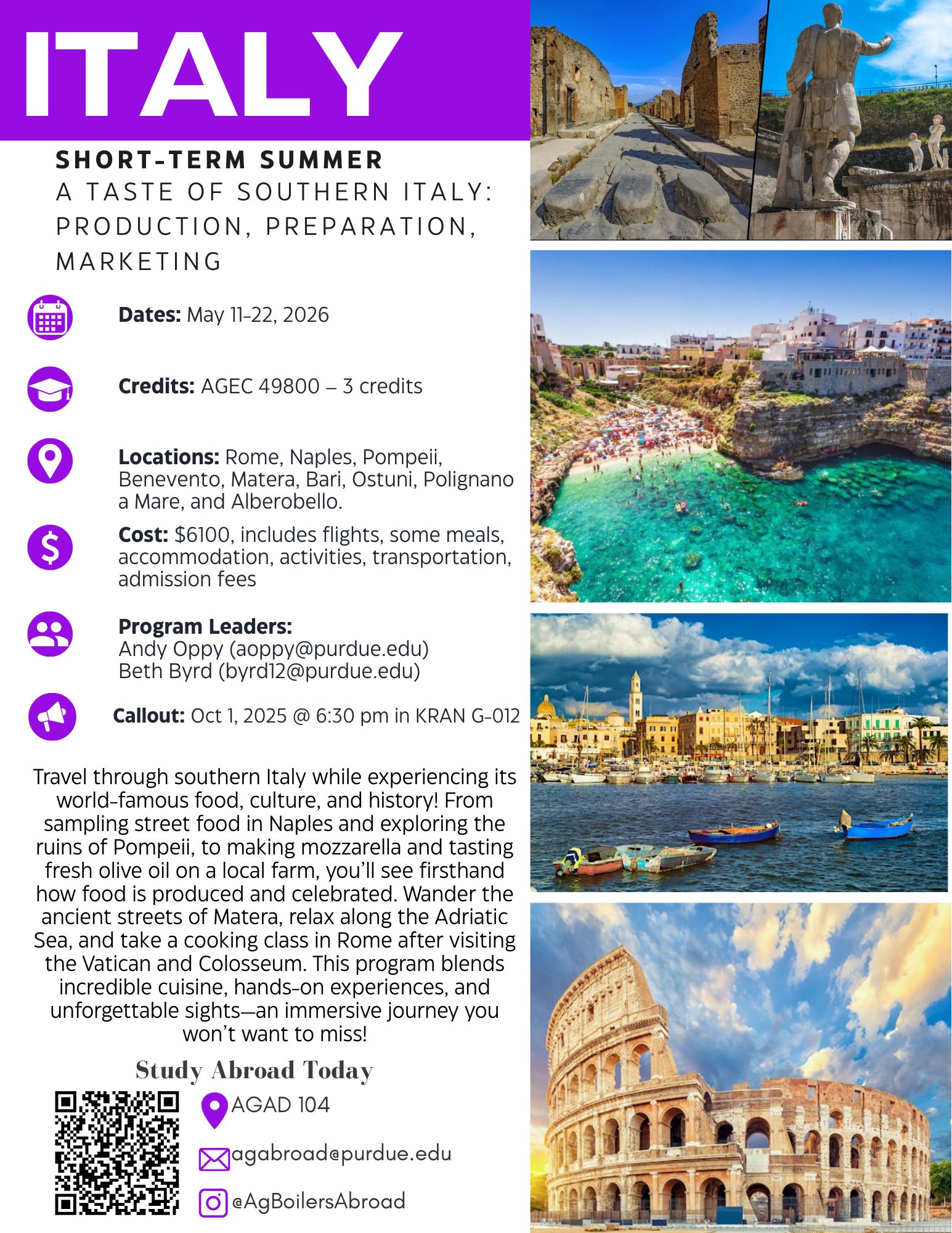 May 11-22, 2026
May 11-22, 2026- Credits: AGEC 49800 – 3 credits
- Cost: $6100 includes airfare, some meals, accommodation, in-country transportation, activities, 3 credits and international medical insurance.
- Leaders: Andy Oppy & Beth Byrd
- Callout: October 1, 2025 @ 6:30 pm in Krannert G-12
Heartland to heartland: agriculture in belgium, germany and THE NETHERLANDS
This program is FULL for Summer 2026.
 May 19-30, 2026
May 19-30, 2026- Credits: ANSC 49500 – 3 credits
- Cost: $3950 which includes accommodation, admission fees, transportation in countries, 3 credits, international medical insurance, some meals. It does not include airfare, some meals, personal expenses or souvenirs.
- Leaders: Claire Adams-Weaver & Stacy Zuelly
- Callout: September 11, 2025 @ 6:00 pm in Creighton Hall 1042
Discover the heart of European agriculture, history, and innovation! This 12-day study abroad adventure takes you through Belgium, Germany, and the Netherlands—three countries rich in cultural heritage and agricultural leadership. Explore everything from Belgian draft horse farms and dairy operations to cutting-edge facilities like the Netherlands Plant Eco-Phenotyping Center and CLAAS Technoparc. Along the way, enjoy chocolate-making workshops, vineyard tastings, and a tour of the iconic Aalsmeer Flower Auction. Walk the historic streets of Brussels, Cologne, and Amsterdam, and visit meaningful sites like the Arnhem WWII battlefield. You’ll gain firsthand insight into global agricultural systems while experiencing some of Europe’s most vibrant cities. Whether you're passionate about animal science, sustainable farming, or international perspectives, this program is packed with hands-on learning and unforgettable moments. Join us and see how agriculture connects communities across borders.
In The English Landscape
This program is FULL for Summer 2026.
 May 18 - June 10, 2026
May 18 - June 10, 2026- Credits: HORT 450 or LA 450 or HIST 450 - 3 credits
- Cost: $4900 includes housing, some meals, admission fees, medical insurance, 3 credits, transportation in country. Airfare is not included.
- Leaders: Sean Rotar &
- Callout: TBA
Explore England like never before—through its stunning landscapes! From iconic gardens and royal parks to charming countryside and bustling city spaces, you’ll see how the English landscape tells the story of history, culture, and daily life. Walk through spaces that blend beauty and function, discover plants you won’t find back home, and experience a country that treasures its green spaces. This is your chance to live and learn in England while seeing how landscapes shape the way people work, play, and connect.
AGRICULTURE & NATURAL RESOURCES in ICElAND
This program is FULL for Summer 2026.
 May 10-20, 2026
May 10-20, 2026- Credits: AGR 49300 or AGEC 49800 or NRES 49800 – 3 credits
- Cost: $4750 which includes accommodation, admission fees, transportation in countries, 3 credits, international medical insurance, some meals. It does not include airfare, some meals, personal expenses or souvenirs.
- Leaders: Christine Wilson & Christie Shee
- Callout: September 15, 2025 at 5:30 pm in PFEN 241
Discover the land of fire and ice while exploring how farmers, communities, and innovators adapt to one of the world’s most extreme environments. On this 10-day program, you’ll travel across volcanic landscapes, coastal fishing villages, glaciers, and fertile valleys while learning firsthand about sustainable farming, aquaculture, and resource use. Through farm stays, hands-on field visits, and conversations with local experts, you’ll see how Iceland balances tradition with cutting-edge innovation in food and agriculture. Beyond academics, you’ll soak in geothermal pools, visit puffin habitats, and experience the culture and resilience of rural Icelandic life.
The Role of HorSES in IRISH CULTURe & Society
This program is FULL for Summer 2026.
 May 10-27, 2026
May 10-27, 2026- Credits: ANSC 49500 & ASEC 49100 – 3 credits
- Cost: $4100 which includes accommodation, admission fees, transportation in countries, 3 credits, international medical insurance, some meals. It does not include airfare, some meals, personal expenses or souvenirs.
- Leaders: Colleen Brady & Keri Blair
- Callout: September 22, 2025 @ 4:00 pm in Lilly G-458
Explore the heart of Ireland through agriculture, horses, and history! This immersive study abroad program takes you across stunning landscapes—from the rolling hills of County Mayo to the rugged Dingle Peninsula. Tour world-renowned equine facilities like Coolmore Stud, the Irish National Stud, and university equine programs. Visit innovative farms, the College of Agriculture, Food and Rural Enterprise (CAFRE), and gain insights into rural life and sustainability in Ireland. Along the way, you'll hike in Wild Nephin National Park, ferry to the Aran Islands, and stand atop the Cliffs of Moher. Cultural highlights include a walking tour in Derry, a traditional jaunting car ride in Killarney, and time to explore vibrant cities like Galway, Kilkenny, and Dublin. Whether you're passionate about agriculture, natural resources, or Ireland’s rich heritage, this program offers unforgettable hands-on learning and cultural discovery.
A TASTE OF SOUTHERN ITALY: PRODUCTION, PREPaRATION, Marketing
This program is FULL for Summer 2026.
 May 11-22, 2026
May 11-22, 2026- Credits: AGEC 49800 – 3 credits
- Cost: $6100 includes airfare, some meals, accommodation, in-country transportation, activities, 3 credits and international medical insurance.
- Leaders: Andy Oppy & Beth Byrd
- Callout: October 1, 2025 @ 6:30 pm in Krannert G-12
Processes, Sustainability, Entrepreneurship in the Agri-Food Industry
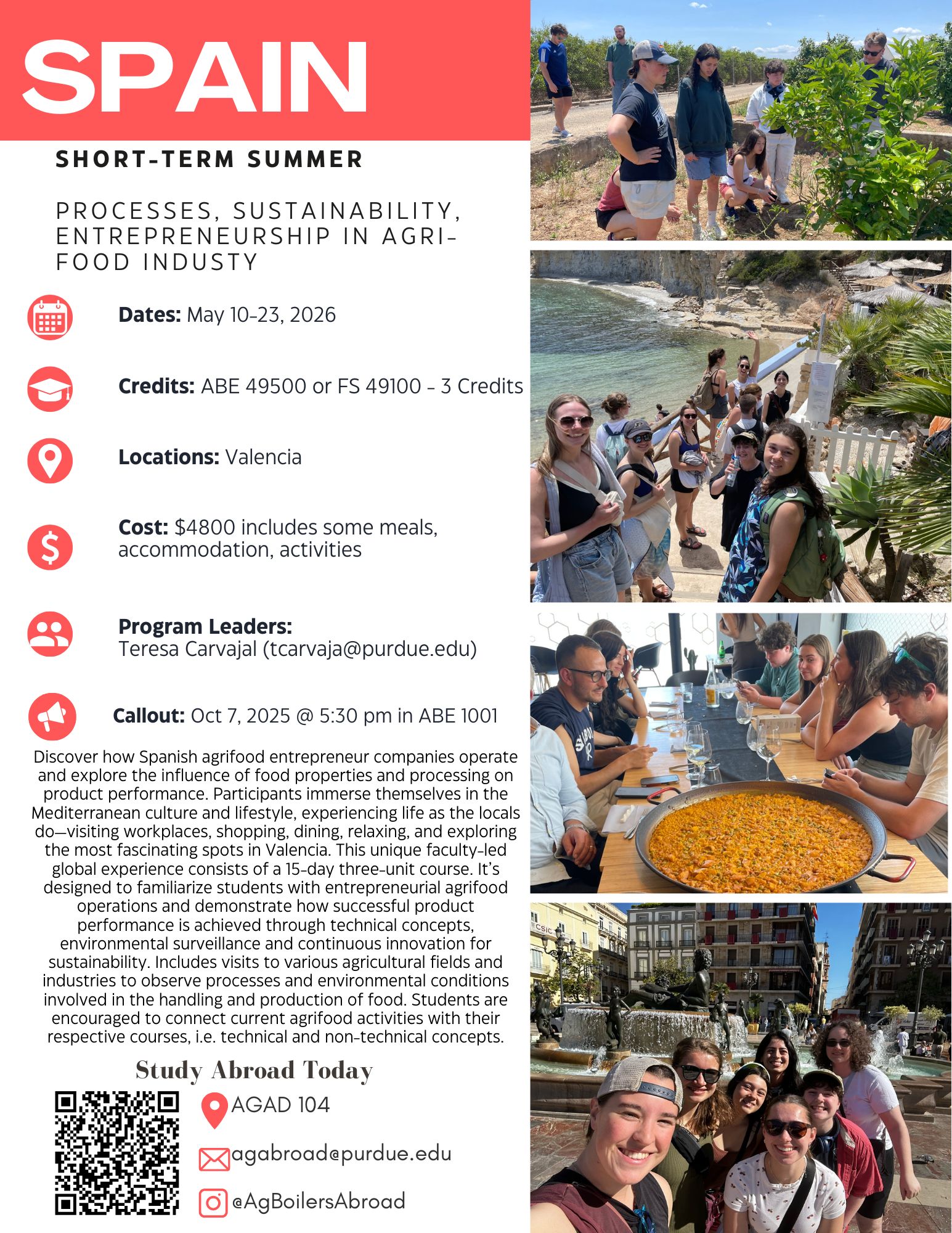 May 10-23, 2026
May 10-23, 2026- Credits: ABE 49500 or FS 49100 – 3 credits
- Cost: $4800 which includes international medical insurance, housing, all meals, admission fees, weekend trip, transportation in country and 3 credits. It does not include airfare, personal expenses or souvenirs.
- Leader: Teresa Carvajal &
- Callout: October 7, 2025 @ 5:30 pm in ABE 1001
Discover how Spanish agrifood entrepreneur companies operate and explore the influence of food properties and processing on product performance. Participants immerse themselves in the Mediterranean culture and lifestyle, experiencing life as the locals do—visiting workplaces, shopping, dining, relaxing, and exploring the most fascinating spots in Valencia.
This unique faculty-led global experience consists of a 15-day three-unit course. It’s designed to familiarize students with entrepreneurial agrifood operations and demonstrate how successful product performance is achieved through technical concepts, environmental surveillance and continuous innovation for sustainability.
Includes visits to various agricultural fields and industries to observe processes and environmental conditions involved in the handling and production of food. Students are encouraged to connect current agrifood activities with their respective courses, i.e. technical and non-technical concepts.
FERMENTATION, FOOD & CUlture in JAPAN
This program is FULL for Summer 2026.
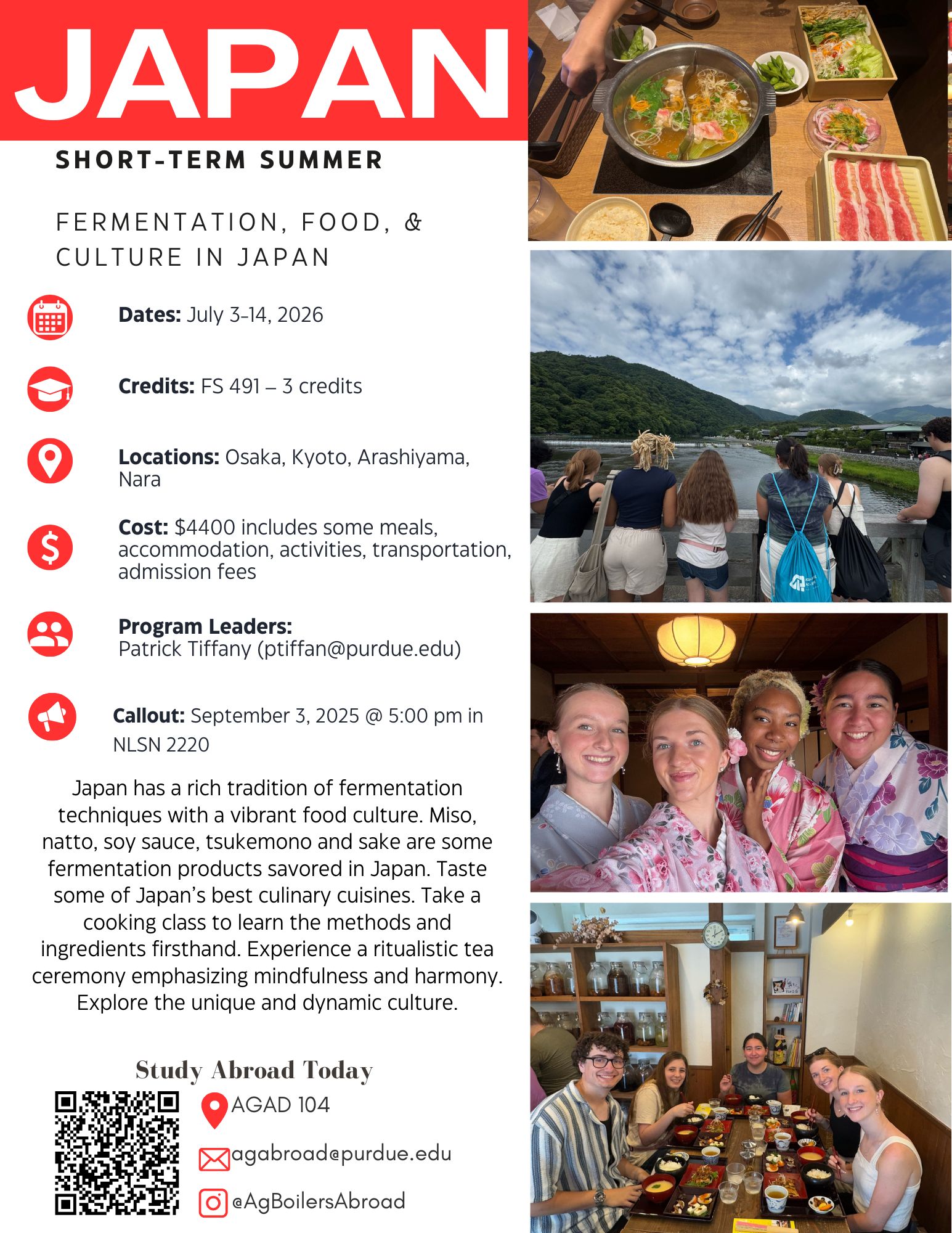 July 3-14, 2026
July 3-14, 2026- Credits: FS 49100 – 3 credits
- Cost: $4400 includes activities, accommodation, in-country transportation, 3 credits, medical insurance & some meals. Airfare not included.
- Leaders: Patrick Tiffany and
- Callout: September 3, 2025 @ 5:00 pm in NLSN 2220
Japan has a rich tradition of fermentation techniques with a vibrant food culture. Miso, natto, soy sauce, tsukemono and sake are some fermentation products savored in Japan. Taste some of Japan’s best culinary cuisines. Take a cooking class to learn the methods and ingredients firsthand. Experience a ritualistic tea ceremony emphasizing mindfulness and harmony. Explore the unique and dynamic culture.
SWEDEN & norway: INTERNATIONAL NATURAL RESOURCES
APPLY ONLINE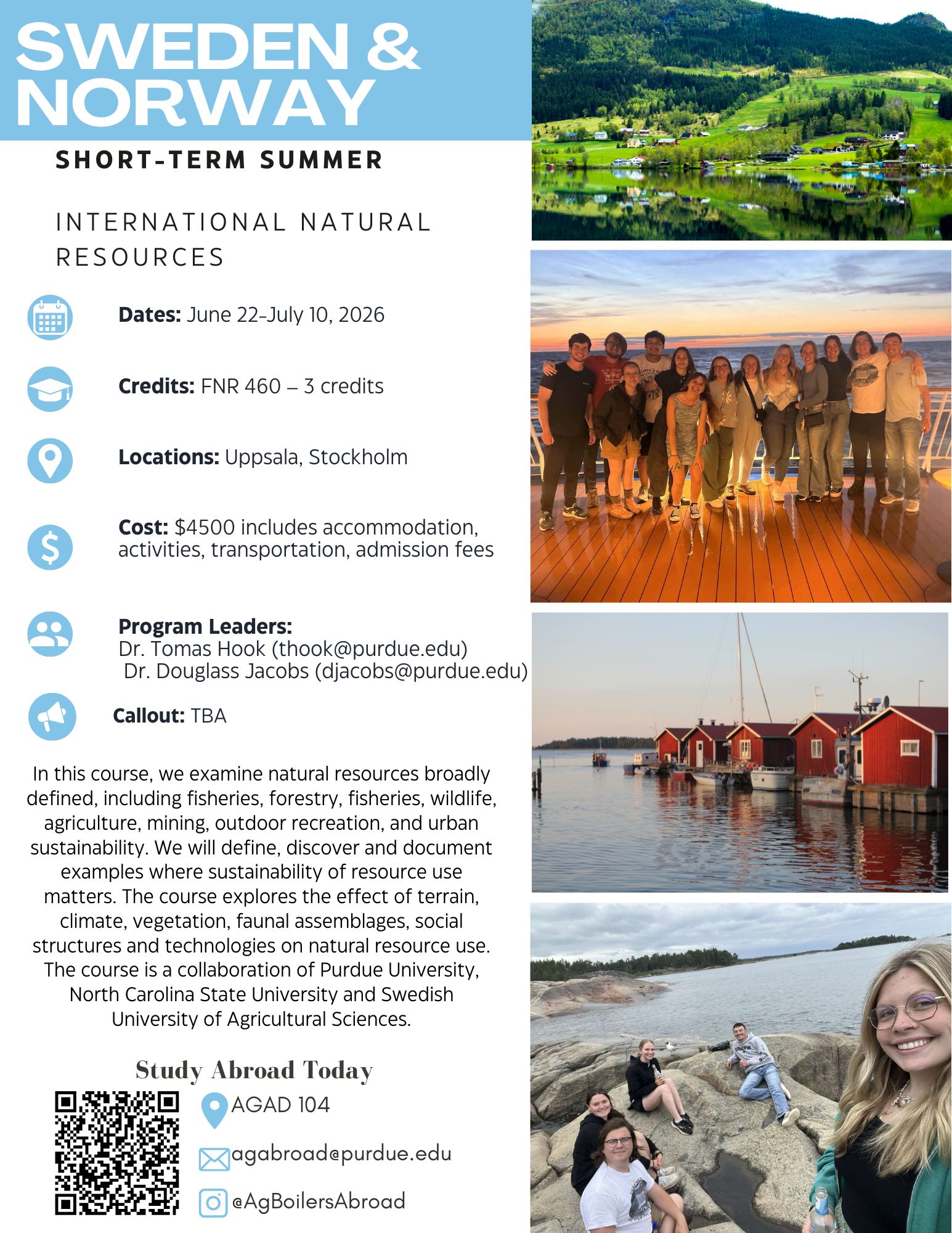 June 22-July 10, 2026
June 22-July 10, 2026- Credits: FNR 46000 – 3 credits
- Cost: $4500 which includes international medical insurance, housing, admission fees, transportation in country and 3 credits. It does not include meals, airfare, personal expenses or souvenirs.
- Leaders: Dr. Tomas Hook & Dr. Douglass Jacobs
- Callout: February 2, 2026 at 5 pm in PFEN 120
In this course, we examine natural resources broadly defined, including fisheries, forestry, fisheries, wildlife, agriculture, mining, outdoor recreation, and urban sustainability. We will define, discover and document examples where sustainability of resource use matters. The course explores the effect of terrain, climate, vegetation, faunal assemblages, social structures and technologies on natural resource use. The course is a collaboration of Purdue University, North Carolina State University and Swedish University of Agricultural Sciences.
Processes, Sustainability, Entrepreneurship in the Agri-Food Industry
 May 10-23, 2026
May 10-23, 2026- Credits: ABE 49500 or FS 49100 – 3 credits
- Cost: $4800 which includes international medical insurance, housing, all meals, admission fees, weekend trip, transportation in country and 3 credits. It does not include airfare, personal expenses or souvenirs.
- Leader: Teresa Carvajal &
- Callout: October 7, 2025 @ 5:30 pm in ABE 1001
Discover how Spanish agrifood entrepreneur companies operate and explore the influence of food properties and processing on product performance. Participants immerse themselves in the Mediterranean culture and lifestyle, experiencing life as the locals do—visiting workplaces, shopping, dining, relaxing, and exploring the most fascinating spots in Valencia.
This unique faculty-led global experience consists of a 15-day three-unit course. It’s designed to familiarize students with entrepreneurial agrifood operations and demonstrate how successful product performance is achieved through technical concepts, environmental surveillance and continuous innovation for sustainability.
Includes visits to various agricultural fields and industries to observe processes and environmental conditions involved in the handling and production of food. Students are encouraged to connect current agrifood activities with their respective courses, i.e. technical and non-technical concepts.
FERMENTATION, FOOD & CUlture in JAPAN
This program is FULL for Summer 2026.
 July 3-14, 2026
July 3-14, 2026- Credits: FS 49100 – 3 credits
- Cost: $4400 includes activities, accommodation, in-country transportation, 3 credits, medical insurance & some meals. Airfare not included.
- Leaders: Patrick Tiffany and
- Callout: September 3, 2025 @ 5:00 pm in NLSN 2220
Japan has a rich tradition of fermentation techniques with a vibrant food culture. Miso, natto, soy sauce, tsukemono and sake are some fermentation products savored in Japan. Taste some of Japan’s best culinary cuisines. Take a cooking class to learn the methods and ingredients firsthand. Experience a ritualistic tea ceremony emphasizing mindfulness and harmony. Explore the unique and dynamic culture.
SWEDEN & norway: INTERNATIONAL NATURAL RESOURCES
APPLY ONLINE June 22-July 10, 2026
June 22-July 10, 2026- Credits: FNR 46000 – 3 credits
- Cost: $4500 which includes international medical insurance, housing, admission fees, transportation in country and 3 credits. It does not include meals, airfare, personal expenses or souvenirs.
- Leaders: Dr. Tomas Hook & Dr. Douglass Jacobs
- Callout: February 2, 2026 at 5 pm in PFEN 120
In this course, we examine natural resources broadly defined, including fisheries, forestry, fisheries, wildlife, agriculture, mining, outdoor recreation, and urban sustainability. We will define, discover and document examples where sustainability of resource use matters. The course explores the effect of terrain, climate, vegetation, faunal assemblages, social structures and technologies on natural resource use. The course is a collaboration of Purdue University, North Carolina State University and Swedish University of Agricultural Sciences.
